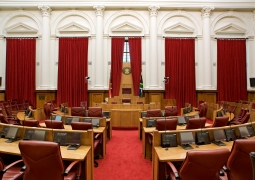
The Minister of Home Affairs, Dr Aaron Motsoaledi, during an oral question and reply session with Ministers in the Peace and Security Cluster 1C in the NCOP on Tuesday, had to field questions from delegates on his department’s plans to address long queues at Home Affairs offices.
Dr Motsoaledi said that his department is introducing a virtual interactive self-service machine, also called a kiosk, which will be introduced in the nine provinces, especially in rural areas that are not connected. The minister explained to delegates that with this system people will be able to serve themselves, like using an ATM at a bank. “They will be able to get their IDs. It also depends on the facial recognition system that we are already piloting,” he said. He said the department had already ordered and piloted these kiosks.
According to the Minister, however, the kiosks cannot process first-time applications for IDs, but only reissue IDs.
Doing what we can
He told delegates that coming up with solutions for long queues is only addressing the symptoms of the issue. “The heart of long queues is the SITA system that is always down,” he said. SITA is the State Information Technology Agency. Dr Motsoaledi said his department depends on SITA for connectivity, especially in rural villages. He said that while SITA has its own plans for revamping its system and addressing its challenges, long queues at the Department of Home Affairs offices remain a big headache. “So, in the meantime, we are doing what we can,” he said, referring to the BAPS system and the new kiosks.
The BAPS system, Dr Motsoaledi explained, is a branch appointment booking system for the live capture of IDs and passports. He said the system means people only arrive at the Home Affairs offices at the time given to them. “And most people who are using this spend no more than 15 minutes in Home Affairs, obviating the problem of long queues.”
One EFF delegate from the Northern Cape asked the Minister why his department is not partnering with other departments to have permanent offices in communities – like taking Home Affairs to the people. She asked what the department is doing to ensure that people receive the documents they need since many in rural areas cannot afford to travel elsewhere to get documents such as death certificates.
According to Dr Motsoaledi, his department uses mobile units that have all the equipment and even generators to provide services in more remote areas. He said the department already has about 100 of these units and is expecting 100 more soon that will help provide services to more rural communities.
The Minister also provided an update on the progress of the Border Management Authority and had to explain what measures his department has in place to prevent the “possible abuse of the new e-visa system by some foreign nationals” and how the department intends to modernise the immigration services.
SA’s push for UN Reform
Deputy Minister of International Relations, Mr Alvin Botes was second in line to provide responses to delegates’ questions. While Minister of International Relations and Cooperation, Dr Naledi Pandor on Tuesday in the National Assembly called for a reform of the global governance system amid the ongoing humanitarian crisis in Gaza, Mr Botes also told delegates that the South African government will continue to advance their UN reform agenda. He was asked, “whether South Africa has influenced the United Nations to start discussions on its transformation to serve its role cognisant of the current global dynamics?”
The question was posed by Ms Shahidabibi Shaikh.
“The South African government has been a consistent, ardent and vocal advocate for the reform of the United Nations in particular the UN Security Council, which has the final mandate to provide the stewardship as it relates to the peace and security architecture,” Mr Botes said. He said over the years, South Africa has been arguing for the need to reform the Security Council so that it reflects the diversity of the member states of the United Nations.
“We do so, understanding that the Security Council established in 1945, of course, can no longer constitute a summary reflection 78 years later in 2023. Mr Botes said that the current reconfiguration where you have the five permanent members with veto powers too often result in a stalemate in the balance of forces to resolve peace and security issues. He said South Africa is of the view that if the Security Council is not reformed, it will continue to lack legitimacy in the eyes of those member states and regions of the world that are not represented.
Alicestine October
8 November 2023

